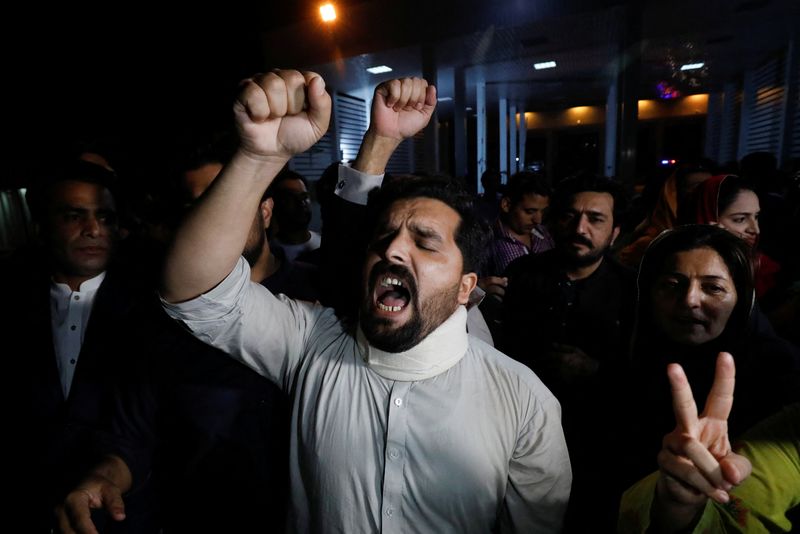By Asif Shahzad and Syed Raza Hassan
ISLAMABAD (Reuters) -Opposition politician Shehbaz Sharif submitted his nomination to be Pakistan's next prime minister to the legislature on Sunday, his party said, after incumbent Imran Khan lost a no-confidence vote in parliament after nearly four years in power.
The younger brother of three-times prime minister Nawaz Sharif, Shehbaz, 70, has led a bid by the opposition in parliament to topple former cricket star Khan, and he is widely expected to replace him following a vote on Monday.
But Khan's party also submitted papers nominating the former foreign minister as a candidate, saying their members of parliament would resign en masse should he lose, potentially creating the need for urgent by-elections for their seats.
Khan, the first Pakistani prime minister to be ousted by a no confidence vote, had clung on for almost a week after a united opposition first tried to remove him.
On Sunday, he repeated allegations that a foreign conspiracy was behind the regime change.
"The freedom struggle begins again today," he said via his Twitter (NYSE:TWTR) account, which is followed by more than 15 million and still describes him as Prime Minister of Pakistan in his biography section.
Even before the vote Khan had called for protests, which were expected to take place late on Sunday.
"I tell all of my supporters across Pakistan, on Sunday, after Isha (evening) prayers, you all have to come out of your homes and protest peacefully against this imported government that is trying to come to power," he said in an address to the nation on Friday.
His government fell in the early hours of Sunday after a 13-hour session that included repeated delays and lengthy speeches by lawmakers from his Pakistan Tehreek-e-Insaf party.
Opposition parties were able to secure 174 votes in the 342-member house for the no-confidence motion, giving them the majority they needed to enable Monday's vote to elect a new premier.
Khan's former information minister Fawad Chaudhry told reporters of the plan for resignations if their nominee does not win.
The speaker would be obliged to accept those resignations that would necessitate by-elections in probably more than 100 seats.
That could plunge the country into another crisis as the election commission has previously said it would not be ready to hold elections until October.
ROLE OF MILITARY?
Two sources who declined to be identified said the vote that ousted Khan went ahead after the powerful army chief, General Qamar Javed Bajwa, met Khan, as criticism mounted over the delay to the parliamentary process. The Supreme Court has also ordered parliament to convene and hold the vote.
The military has ruled the country of 220 million people for almost half its nearly 75-year history.
It viewed Khan and his conservative agenda favourably when he won election in 2018, but that support waned after a falling-out over the appointment of the influential military intelligence chief and economic troubles that led to the largest interest rate rise in decades this week.
Khan had antagonised the United States throughout his tenure, welcoming the Taliban takeover of Afghanistan last year and more recently accusing the United States of being behind the attempt to oust him. Washington dismissed the accusation.
Shehbaz Sharif said Khan's departure was a chance for a newbeginning.
"A new dawn has started ... This alliance will rebuildPakistan," he told parliament on Sunday.
Sharif was for years chief minister of Punjab province and has a reputation as an effective administrator.
His first tasks would be to repair relations with the powerful military as well as ally the United States, and tend to a stuttering economy.
Some analysts say navigating major political and economic hurdles with a united front would be a challenge for the new coalition, which comprises several diverse political parties.

"There are going to be divisions and divergences within the key coalition partners," said Mosharraf Zaidi, senior fellow at thinktank Tabadlab, adding the first likely hurdle would be the raising of fuel prices in coming days.
"They are going to face both internal resistance within the coalition and possibly even criticism by coalition members and that will be in the first few days, not even weeks," he added.